专题六 并列句和状语从句
高考必考语法:并列句与状语从句

高考必考语法:并列句与状语从句一、并列句(一) 并列连词①They come from the same country,and they are good friends.②I was glad to meet Jenny again,but I didn't want to spend all day with her.(2013·新课标卷Ⅱ)③It must have rained last night,for it is wet all over.④Yesterday, I forgot to pick my daughter up, so she waited in the kindergarten for nearly two hours.⑤Would you like to leave or would you like to stay? 规律总结:1.表示并列、顺承关系的并列连词有and。
2. 表示转折关系常用的并列连词有but, yet(然而), whereas(然而,但是), while(然而)等。
3.表示因果关系的并列连词有for, so等。
4.表示选择关系常用的并列连词有or, either ... or ..., not ... but, neither ... nor ...等。
(二) 祈使句+and/or/otherwise句式①Work hard and you will succeed.=If you work hard, you will succeed.②Hurry up or we will be late.=If you don't hurry up, we will be late.③A few more efforts and you will succeed.=If you make a few more efforts, you will succeed.规律总结:1.祈使句+and+陈述句=If ...,+主句。
并列句与状语从句讲解
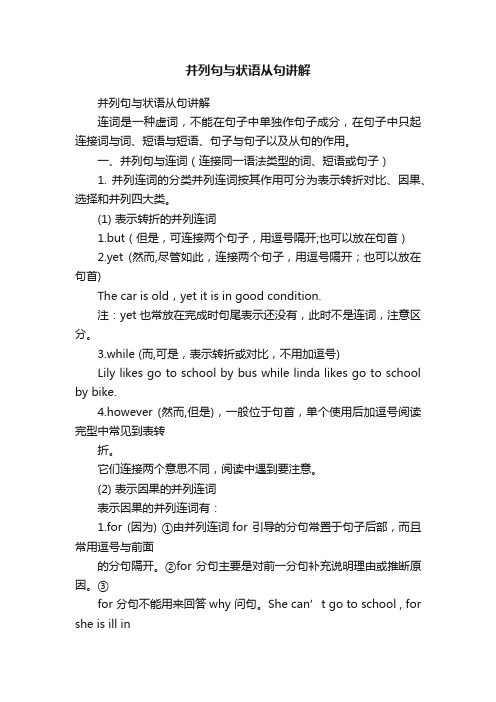
并列句与状语从句讲解并列句与状语从句讲解连词是一种虚词,不能在句子中单独作句子成分,在句子中只起连接词与词、短语与短语、句子与句子以及从句的作用。
一、并列句与连词(连接同一语法类型的词、短语或句子)1. 并列连词的分类并列连词按其作用可分为表示转折对比、因果、选择和并列四大类。
(1) 表示转折的并列连词1.but(但是,可连接两个句子,用逗号隔开;也可以放在句首)2.yet (然而,尽管如此,连接两个句子,用逗号隔开;也可以放在句首)The car is old,yet it is in good condition.注:yet也常放在完成时句尾表示还没有,此时不是连词,注意区分。
3.while (而,可是,表示转折或对比,不用加逗号)Lily likes go to school by bus while linda likes go to school by bike.4.however (然而,但是),一般位于句首,单个使用后加逗号阅读完型中常见到表转折。
它们连接两个意思不同,阅读中遇到要注意。
(2) 表示因果的并列连词表示因果的并列连词有:1.for (因为) ①由并列连词for 引导的分句常置于句子后部,而且常用逗号与前面的分句隔开。
②for 分句主要是对前一分句补充说明理由或推断原因。
③for 分句不能用来回答why 问句。
She can’t go to school , for she is ill inbed.2.so (所以) 可以连接两个句子,中间有时用逗号隔开;也可以放在一个句子的句首。
例:The shop doesn't open until 11 . , so we should go there later..3.therefore (因此),用法和however类似,但词义不一样(3) 表示选择的并列连词表示选择的并列连词有:or (或者),either…or (不是……就是……,或者……或者……)[注]①or用在祈使句中,意为“否则”,Hurry up, or you’ll be late. 快点,否则你就会迟到了。
高考英语考点汇总并列句和状语从句

并列句和状语从句一、并列连词1.表示并列关系的连词:and: 可用来连接两个或两个以上的单词/短语或句子,表示一种顺接的关系。
☞He helps me and I help him. 他帮我,我帮他。
both…and:"两个都……",连接两个并列主语时谓语动词用复数。
☞Both Li Ping and Mary are going to the Great Wall tomorrow.neither…nor: "既不……也不……",连接的并列成分可在句中作主语、表语、宾语等。
连接并列成分作主语时,谓语动词通常与nor后的部分保持一致。
☞Neither he nor I am right.not only…but also: "不仅……而且……",强调后者;引导并列主语时,谓语动词与后面的主语保持一致。
☞Not only the students but also the teacher gives the money to our school.2. 表示选择关系的连词:or:用于否定句中连接并列成分,表示"和,与";用于"祈使句+or+陈述句"中,意为"否则,要不然"。
☞The baby is too young. He can’t speak or walk.either…or…:"要么……要么",连接的并列成分可在句中作主语、表语、宾语等。
连接并列成分作主语时,谓语动词通常与or后的部分保持一致。
☞Either Tom is ing or his sisters are. 不是汤姆就是她的姐妹们要来。
3. 表示转折关系的并列连词4. 表示因果关系的并列连词for :so : 4. when 可作并列连词,意为“正在这时”,表示某件事正在发生或刚刚发生时,突然发生另一动作。
⎩⎪⎨⎪⎧ be about to do...when...be doing...when...be on the point of doing...when...had just done...when...☞Tom was about to close the window when his attention was caught by a bird.汤姆正要关窗户,这时他的注意力被一只鸟吸引住了。
专题讲解--状语从句

专题讲解-------并列句和状语从句【考点点击】:1.引导状语从句的从属连词的用法2.表示条件、时间、原因等意义的状语从句的用法。
3.并列句的选词并列句一、定义:用并列连词连接起来的两个或两个以上的简单句叫作并列句。
其构成为:简单句+并列连词+简单句二、并列句的种类1.表示顺承、并列、递进关系的连词及并列句and “和‟both…and….”“···和···两个都”,as well as “也”;not only…but also….”“不但···而且···”等。
My mother bought me a dress, and I like it very much.2.表示转折或对比关系的连词及并列句。
but “但是”. yet “然而”;while “而”.Lucy likes red while Luly likes white.3.表示选择关系的连词及并列句:either……or………” “要么….要么”连接主语时,采用就近原则。
Or “或者”,还可以表示“否则”。
Study hard, or you …ll fail the exam.4.表示因果关系的连词及并列句:so 意为“所以,因此”,表示因果关系。
Ann was ill so she didn‟t ho to shool.for:意为“因为”,也表示因果关系。
I have to stay up late, for I have lots of homework to do.5. and 和or用于否定句中的区别(1)当列举成分是主语,又在否定词之前时,用and 连接,当列举成分在否定词之后时,用or 构成完全否定。
Lucy and Lily can‟t speak Chinese. I can‟t sing or dance.(2) 在否定句中,如果所连接的两部分都有否定词,那么用and, 而不用or.There is no water and no air on the moon.状语从句一、定义:在句子中作状语的从句叫做状语从句。
超实用高考英语复习:并列句与状语从句-高频考点解密

表因果关系。for连接的 Some animals carry seeds from one place to another, so 分句一般不放在句首。 plants can spread to new places.一些动物将种子从一个
地方带到另一个地方,因此植物(的种子)可以被传播 到新的地方。
•The father waited until his daughter had finished her homework. 那位父亲一直等到他的女儿做完作业。
•The baby didn't go to bed until/till his mother returned. 这个孩子直到他的妈妈回来才睡觉。
or, either… or…等 表选择关系。
Either you must improve your work or I shall dismiss
you. 要么你改进工作,要么我就辞退你。
考点一 并列句
讲解
并列连词 for, so等 and, or等
用法
例句
The leaves of trees are falling, for it's already autumn. 树叶掉落,因为秋天已经到了。
•They have been friends since they met for the first time in London. 自从在伦敦第一次见面以来,他们一直是朋友。
状语从句与并列句
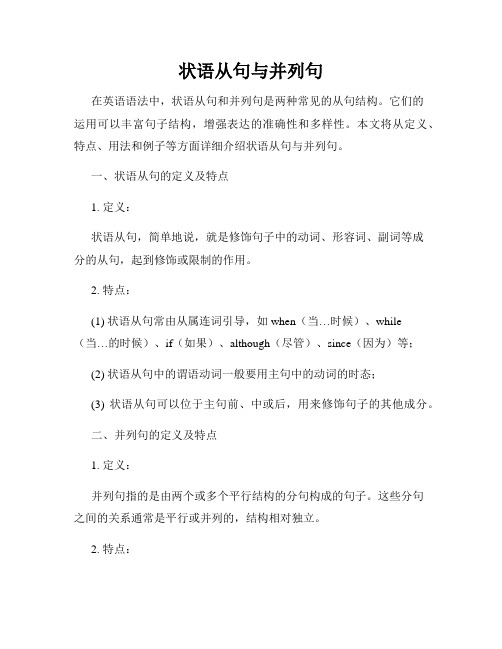
状语从句与并列句在英语语法中,状语从句和并列句是两种常见的从句结构。
它们的运用可以丰富句子结构,增强表达的准确性和多样性。
本文将从定义、特点、用法和例子等方面详细介绍状语从句与并列句。
一、状语从句的定义及特点1. 定义:状语从句,简单地说,就是修饰句子中的动词、形容词、副词等成分的从句,起到修饰或限制的作用。
2. 特点:(1) 状语从句常由从属连词引导,如when(当…时候)、while (当…的时候)、if(如果)、although(尽管)、since(因为)等;(2) 状语从句中的谓语动词一般要用主句中的动词的时态;(3) 状语从句可以位于主句前、中或后,用来修饰句子的其他成分。
二、并列句的定义及特点1. 定义:并列句指的是由两个或多个平行结构的分句构成的句子。
这些分句之间的关系通常是平行或并列的,结构相对独立。
2. 特点:(1) 并列句中的分句之间一般用逗号或并列连词连接,如and(和)、but(但是)、or(或者)等;(2) 并列句中的分句通常要保持结构平行,包括时态、语态、语气等方面的平行。
三、状语从句的用法及例子1. 时间状语从句:时间状语从句用来表示动作发生的时间,常由when、while、before、after、since等引导。
例子:- I will call you when I arrive at the airport.(当我到达机场时,我会给你打电话。
)- She was watching TV while her mother was cooking.(她妈妈在做饭的时候,她在看电视。
)2. 条件状语从句:条件状语从句用来表示主句动作发生的条件,常由if、unless、on condition that等引导。
例子:- If it rains tomorrow, we will stay at home.(如果明天下雨,我们会待在家里。
)- You can go outside unless it is too cold.(除非天气太冷,你可以出去玩。
21版:并列句和状语从句(步步高)

并列句和状语从句一、并列句并列句由两个或两个以上并列而又独立的简单句构成。
在并列句中,这些简单句常由并列连词(短语)连在一起。
注意:when可用作并列连词,相当于and at this/that time,意为“正在这/那时;突然”,常用于下列句式:sb.be about to do/going to do/on the point of doing sth.when...(某人正要做某事,突然……);sb.be doing sth.when ...(某人正在做某事,突然……);sb.had just done sth.when ...(某人刚做完某事,突然……)。
He was about to go out when the telephone rang.他正要出去,电话铃突然响了。
He had just finished writing a report when the boss let him type a letter.他刚写完一篇报告,老板就让他打印一封信件。
单句语法填空1.At school,some students are active while some are shy,yet they can be good friends with one another.2.The other day I was doing some grocery shopping when a man walked toward a group of us at the checkout stand.3.Follow your doctor’s advice,or your cough will get worse.4.John plays basketball well,but/yet his favorite sport is badminton.单句改错(每小题仅有1处错误)5.It seems to me that autumn is the most grand and impressive season in a year.First of all,neithercan I suffer summer’s heat,ornor can I go through winter’s coldness.6.Though not very big,but the restaurant is popular in our area. 7.Because life is beautiful,so we should fully enjoy it.8.When I was 10,once my parents were away on business,butand/so I had to stay at home alone fora day.二、状语从句考点一让步状语从句though,although,as,even if/though,whether...or...,while 等引导的让步状语从句1.although与though可以引导让步状语从句,不能与but连用,但可以与yet连用。
并列句和状语从句考点透析
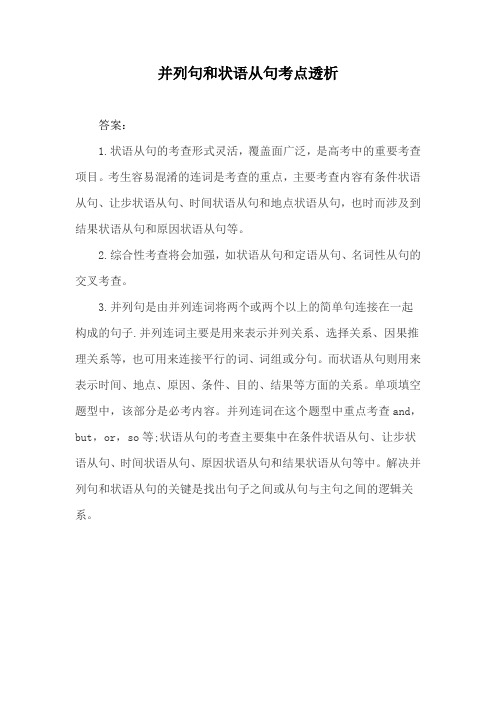
并列句和状语从句考点透析
答案:
1.状语从句的考查形式灵活,覆盖面广泛,是高考中的重要考查项目。
考生容易混淆的连词是考查的重点,主要考查内容有条件状语从句、让步状语从句、时间状语从句和地点状语从句,也时而涉及到结果状语从句和原因状语从句等。
2.综合性考查将会加强,如状语从句和定语从句、名词性从句的交叉考查。
3.并列句是由并列连词将两个或两个以上的简单句连接在一起构成的句子.并列连词主要是用来表示并列关系、选择关系、因果推理关系等,也可用来连接平行的词、词组或分句。
而状语从句则用来表示时间、地点、原因、条件、目的、结果等方面的关系。
单项填空题型中,该部分是必考内容。
并列连词在这个题型中重点考查and,but,or,so等;状语从句的考查主要集中在条件状语从句、让步状语从句、时间状语从句、原因状语从句和结果状语从句等中。
解决并列句和状语从句的关键是找出句子之间或从句与主句之间的逻辑关系。
高考英语专题语法训练——并列句和状语从句

专题3并列句和状语从句考向1并列句中的并列连词Ⅰ.单句语法填空1.It was time for her to have a new baby,and it was also time for the young panda to be independent.(2016·四川)解析句意为:是时候再生一个孩子了,熊猫宝宝也到独立的时候了。
It was time for...和it was also time for...之间是并列关系,故用and连接。
2.But the river wasn’t changed in a few days or even a few months.(2014·新课标全国Ⅰ)解析 a few days和a few months为选择关系,因此要用or连接。
3.We were told that our rooms hadn’t been reserved for that week,but for the week after.(2014·广东) 解析not...but...为固定结构,表示“不是……而是……”。
4.So Nick called to his son,“Go to the village and buy some salt,but pay a fair price for it:neither too much nor too little.”(2013·广东)解析neither...nor...既不……也不……,为固定搭配。
Ⅱ.单句改错(每小题仅有1处错误)1.Before getting into the car,I thought I had learned the instructor’s orders,sobut/yet once I started the car,my mind went blank.(2017·全国Ⅰ)解析根据前后句意思可知这里表示转折概念,并非因果,所以把so改为but或yet。
高考必备语法——并列句和状语从句
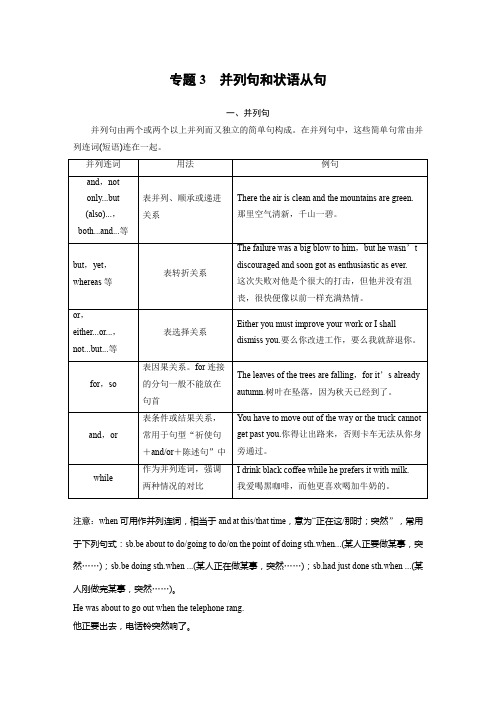
专题3并列句和状语从句一、并列句并列句由两个或两个以上并列而又独立的简单句构成。
在并列句中,这些简单句常由并列连词(短语)连在一起。
注意:when可用作并列连词,相当于and at this/that time,意为“正在这/那时;突然”,常用于下列句式:sb.be about to do/going to do/on the point of doing sth.when...(某人正要做某事,突然……);sb.be doing sth.when ...(某人正在做某事,突然……);sb.had just done sth.when ...(某人刚做完某事,突然……)。
He was about to go out when the telephone rang.他正要出去,电话铃突然响了。
He had just finished writing a report when the boss let him type a letter.他刚写完一篇报告,老板就让他打印一封信件。
单句语法填空1.At school,some students are active while some are shy,yet they can be good friends with one another.2.The other day I was doing some grocery shopping when a man walked toward a group of us at the checkout stand.3.Follow your doctor’s advice,or your cough will get worse.4.John plays basketball well,but/yet his favorite sport is badminton.二、状语从句考点一让步状语从句单句语法填空1.The athletes,especially the winners,should remain modest whatever rapid progress they have made.2.Much as/though I have traveled,I have never seen anyone who’s as capable as John. 3.Don’t trust him,no matter what he says.4.While/Although/Though I admit that there are problems,I don’t agree that they cannot be solved. 5.I’ll do it,even if/though it takes me all the afternoon.6.We’ll go on with the work,whether we can find the necessary tools or not.7.No matter how hard the work is,you’d better try to do it well.考点二时间状语从句单句语法填空1.Not until we succeed in letting wildlife live in peace can we smile in relief.2.Air pollution is getting more and more serious,so we must take action before it is too late. 3.He had no sooner finished his speech than the students started cheering.4.While watching TV,children do not merely absorb words and images.5.As he grew older,he became less active.。
并列句和状语从句讲解

并列句和状语从句讲解一简单句主语+谓1 主语+Vt+宾语(动宾结构)2 主语+Vt+宾语+宾补3 主语+Vt+宾语(Sb)+宾语(Sb)(双宾语)4 主语+Vi5主语+Vi+介词+宾语(介宾)6主语+系动词+表语(系表结构)二并列句1 表示递进2 表示选择3 表示转折4 表示因果三复合句1 定语从句2 名词性从句:主语从句、宾语从句、表语从句、同位语从句3 状语从句:时间、地点、原因、目的、结果、条件、让步、方式、比较一并列句1 表示递进:and, not only…but also…,neither…nor…,not…but…2 表示选择:or, either…or…,otherwise就近原则:Neither he nor I am living here.Either he or I am living here.Not only he but also I am living here.3 表示转折:but, yet, whereas, while4 表示因果:so, as, for, because, since, now that二状语从句1 时间状语从句(1)when, while, as(2)as soon as, immediately, instantly, directly, the moment, the minute, the instant, no sooner…than…,hardly/scarcely…when…The moment/Immediately I heard the voice, I knew Father was coming.No sooner had we arrived at the station than the train left.Hardly had we got home when it began to rain.(3)till, until, not…until(部分倒装,强调句)I didn’t know about it until you told me.Not until you told me did I know about it.It was not until you told me that I knew about it.(4)since, before(5)every time, each time, next time, the first time, any time, all the time+句子2 条件状语从句If, unless, if…not…, so long as, as long as, on condition that, in the event that, suppose/supposing that, provided/providing that3让步状语从句(1) although, though, even though, even if(2) no matter+疑问词,疑问词+ever(3)while, when(4) asFail as I might, I still want to attempt it. (让步)Child as he is, he can lift such a heavy box. (让步)Little as he is, he can lift such a heavy box. (让步)4 地点状语从句Where, wherever, everywhere, nowhere5 方式状语从句as, as if, as though6 结果状语从句(1)so that, so…that…, such… that…(so与such的区别)(2)enough to…, too…to…, so…as to(与can’t, couldn’t ,can never, could never连用)7 目的状语从句In order that, so that, for fear that, in case that, lest8原因状语从句(1)because, since, as, for(2)when, considering that9 比较状语从句than, so/as…as…, the+比较级,the+比较级重要的连词辨析1 as做连词,引导时间、让步、方式、原因和定语从句He hurried home, looking behind as he went.(时间)You will grow wiser as you grow older. (时间)Fail as I might, I still want to attempt it. (让步)Child as he is, he can lift such a heavy box. (让步)Little as he is, he can lift such a heavy box. (让步)Do as you are told to, or you’ll be fired. (方式)As it’s getting darker, we must go home now. (原因)He is not the same man as he was.(定语从句)He is such a clever boy as everyone likes. (定语从句)She is late, as is often the case. (定语从句)while 引导时间、让步、转折并列句Please don’t talk so loud while others are working.While I admit that there are problems, I don’t agree that they can’t be solved.Some men are rich, while others are poor.状语从句中的倒装Not only did he speak more correctly, but also he spoke more easily.Neither does he work hard, nor does his brother.Not until you told me did I know about it.No sooner had we arrived at the station than the train left.Hardly had we got home when it began to rain.So clever a student was he that he was able to work out all the problems.Such a clever student was he that he was able to work out all the problems.though 连词“虽然”让步状语从句Though it was raining hard, yet they went on playing football.Child as/ though he is, he can lift such a heavy box.副词“可是然而”句末He said he would come, he didn’t, though.so和such1 so honest a worker= such an honest worker2 修饰复数可数名词和不可数名词只能用such fine weather/ such difficult problems3 表示数量的词:little, few, many, muchso little money/ so many books4 little:so little a boy= such a little boytoo… to…, enough to…与can’t, couldn’t ,can never, could never连用,越……越好You can’t be too careful when crossing th e street.You can never be careful enough when crossing street.。
高中英语语法专题讲练 并列句与状语从句

并列句与状语从句1 高中英语语法专题讲练 并列句与状语从句一、并列句由并列连词将两个或两个以上平等关系的简单句连接在一起构成的句子叫并列句。
其结构是:简单句+并列连词+简单句 一、并列关系常用的连词有and (同,和), when (=and just at this time 就在这时,然后), not only…but (also)…(不仅……而且……), neither…nor…(既不……也不……)等。
如: He helps me and I help him.他帮我,我帮他。
He not only gave us a lot of advice, but also helped us to study English. 他不仅给我们出很多建议并且还帮助我学英语。
I was just leaving when the telephone rang. 我正要离开,电话铃响了。
二、选择关系常用的连词有or (或者,否则), otherwise (否则), or else (否则), either...or (不是……就是)。
如: Hurry up, or (else) you’ll be late. 快点,否则就会迟到了。
Either Tom is coming or his sisters are. 不是汤姆就是她的姐妹们要来。
三、转折关系常用的连词有but (但是,可是,只是因为), while (而、却), yet (可是)等。
如:It rained heavily yesterday but I had to attend the party.昨天雨下得很大,但是我必须去参加聚会。
I like tea while she likes coffee. 我喜欢喝茶而她喜欢喝咖啡。
四、因果关系常用的连词有for (因为)和so (所以,因此)等。
如: I am thirsty, for it is hot. 我口渴,因为天气太热。
状语从句与并列句
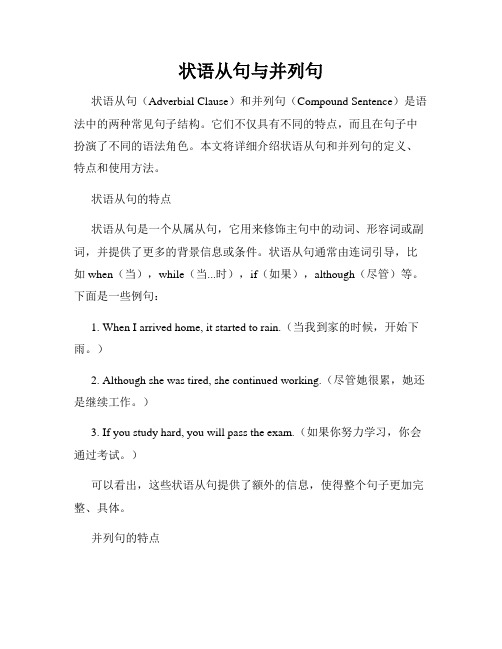
状语从句与并列句状语从句(Adverbial Clause)和并列句(Compound Sentence)是语法中的两种常见句子结构。
它们不仅具有不同的特点,而且在句子中扮演了不同的语法角色。
本文将详细介绍状语从句和并列句的定义、特点和使用方法。
状语从句的特点状语从句是一个从属从句,它用来修饰主句中的动词、形容词或副词,并提供了更多的背景信息或条件。
状语从句通常由连词引导,比如when(当),while(当...时),if(如果),although(尽管)等。
下面是一些例句:1. When I arrived home, it started to rain.(当我到家的时候,开始下雨。
)2. Although she was tired, she continued working.(尽管她很累,她还是继续工作。
)3. If you study hard, you will pass the exam.(如果你努力学习,你会通过考试。
)可以看出,这些状语从句提供了额外的信息,使得整个句子更加完整、具体。
并列句的特点并列句是由两个或多个独立的子句组成的句子,这些子句平等地并列在一起,通过逗号、分号或者连词来连接。
并列句的结构如下:[独立子句1],[连词] [独立子句2]。
常见的并列连词有and(和)、but(但是)、or(或者)等。
下面是一些例句:1. I like playing basketball, and my sister likes playing tennis.(我喜欢打篮球,我姐姐喜欢打网球。
)2. It was raining heavily; therefore, we decided to stay at home.(雨下得很大,所以我们决定呆在家里。
)3. You can either come with us, or you can stay here.(你可以跟我们一起去,也可以留在这里。
并列句及状语从句
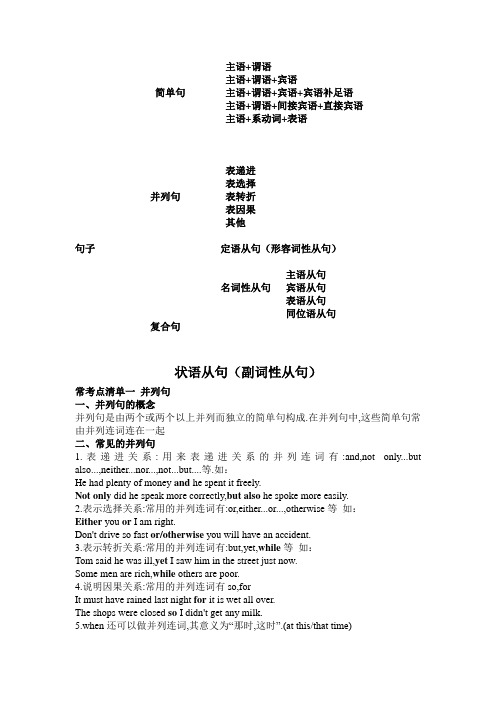
主语+谓语主语+谓语+宾语简单句主语+谓语+宾语+宾语补足语主语+谓语+间接宾语+直接宾语主语+系动词+表语表递进表选择并列句表转折表因果其他句子定语从句(形容词性从句)主语从句名词性从句宾语从句表语从句同位语从句复合句状语从句(副词性从句)常考点清单一并列句一、并列句的概念并列句是由两个或两个以上并列而独立的简单句构成.在并列句中,这些简单句常由并列连词连在一起二、常见的并列句1.表递进关系:用来表递进关系的并列连词有:and,not only...but also...,neither...nor...,not...but....等.如:He had plenty of money and he spent it freely.Not only did he speak more correctly,but also he spoke more easily.2.表示选择关系:常用的并列连词有:or,either...or...,otherwise等如:Either you or I am right.Don't drive so fast or/otherwise you will have an accident.3.表示转折关系:常用的并列连词有:but,yet,while等如:Tom said he was ill,yet I saw him in the street just now.Some men are rich,while others are poor.4.说明因果关系:常用的并列连词有so,forIt must have rained last night for it is wet all over.The shops were closed so I didn't get any milk.5.when还可以做并列连词,其意义为“那时,这时”.(at this/that time)常用于下列句式:①Sb was doing sth when......②Sb was about to/going to do sth when......I was reading a magazine when my mother came in.We were about to set off when it suddenly began to rain.(be about to......when......)6.while作为并列动词,意为“而,却”,表示对比He likes pop music while I am fond of folk music.常考点清单二时间状语从句一、when,while,和as1.when(既可以引导一个延续动作,也可以引导一个短暂动作;可用于主句和从句动作同时发生)如:When I lived there,I used to go to the seaside on Sundays.2.while引导的动作必须是持续性的,侧重于主句动作和从句动作的对比I was watching TV while my mother was cooking.(while可作让步状语从句从属连词,意为“尽管”While I admit that there are problems,I don't agree that they can not be solved.)3.as可表示“当......的时候”;“随着......”如:As a young man,he was fond of reading.As time goes by,it is getting warmer and warmer.二、as soon as,the moment,no sooner......than......,hardly/scarcely...... when(一...就...)The moment I heard the voice,I knew father was coming.No sooner had we arrived at the station than the train left.三、till,until和not......until1.肯定句:主句的谓语动词必须是延续动词,主句、从句都为肯定式,意为“某动作一直延续到某时间点才停止”如:He remained there until/till she arrived.2.否定句:主句的谓语动词必须是延续性动词,从句为肯定式,意为“直到......才”He did n't go to bed until his mother returned.①It was not until you told me that I had any idea of it.(强调句)②Not until you told me did I have any idea of it.(倒装句)四、before和since①before表示“还未......就......;还没来得及”We had sailed four days and four nights before we saw land.Before they reached the station,the train had gone.②It will be+一段时间+before......还要多久才......如:It will be half a year before I come back.It won't be long before we meet again.since 从句的谓语动词一般是非延续性动词,主句的谓语动词是延续动词的或者是反复发生过的动作.since 从句的时态若是一般过去时,相应的,主句中的时态是现在完成时或现在完成进行时如:I have written home four times since I came here.She has been working in this factory since she left school.常考清单三地点状语从句地点状语从句1.引导地点状语从句的从属连词where(在...的地方)We should go to where the Party needs us most.Where there is a will,there is a way.2.where引导的定语从句与状语从句的区分:You had better make a mark where you have any questions.(状语从句)You had better make a mark at the place where you have any questions.(定语从句)常考点清单四原因状语从句引导原因状语从句的从属连词有:because(因为) as(由于) since/ now that(既然)He didn't come to school because he was ill.As it is raining hard,we will n’t go to the park.Now that/Since everybody is here,let's begin our meeting.常考点清单五目的状语从句目的状语从句引导目的状语从句的从属连词有:so that,in order that,in caseI will speak slowly so that you can understand me.In order that we might see the sunrise,we started for the peak early.Take your raincoat in case it rains.常考点清单六结果状语从句1.引导结果状语从句的从属连词有so......that......;such......that......其结构形式:so+形容词/副词+that从句so+形容词+a/an+可数名词单数形式+that从句such+a/an+形容词+可数名词+that从句Tom is so honest a worker that we all believe him.Tom is such an honest worker that we all believe him.It is such fine weather that we all want to go to the park.2.too......to......(太......而不能);so......as to......(那么...以至于)He got up too late to catch the bus.He got up so late as to miss the bus.常考点清单五条件状语从句条件状语从句引导条件状语从句的从属连词有:if(如果);unless(if...not除非/如果不);so/as long as(只要);in case(万一);on condition that(条件是)You will fail the exam unless you study hard.As long as you don't lose heart,you will succeed.In case there is a fire,what will we do first?常考点清单六让步状语从句让步状语从句1.引导让步状语从句的从属连词有:although/though(即使,尽管),even though/even if(即使)(可以和yet,still连用,但不能和but连用)He is unhappy,though/although he has a lot of money.Although it was raining hard,they went on playing football.2.though可用作副词,意为“可是,然而”置于句末如:He said he would come;he didn't,though.3.as或though引导让步状语从句时倒装的情况(表语、状语、动词)Child as/though he is,he knows a lot.Much as/though I like it,I won't buy it for it is too expensive.4.whether...or......(不管...还是...);疑问词+ever与no matter+疑问词(不管.....;无论.....)如:Whether you believe it or not,it is true.Whatever you say,he won't believe you.状语从句专项练习题1.—Our holiday cost a lot of money.—Did it?Well,that doesn't matter_______you enjoyed yourselves.A.as long asB.unlessC.as soon asD.though2.Tom was about to close the window_______his attention was caught by a bird.A.whenB.ifC.andD.till3._______volleyball is her main focus,she is also good at basketball.A.SinceB.OnceC.UnlessD.While4._______our manager objects to Tom's joining the club,we shall accept him as a member.A.UntilB.UnlessC.IfD.After5.The engineer are so busy that they have zero time for outdoor sports activities,_______they have the interest.A.whereverB.wheneverC.even ifD.as if6.It was April 29,2011_______Prince William and Kate Middleton walked into the palace hall of the wedding ceremony.A.thatB.whenC.sinceD.before7.The little boy won't go to sleep_______his mother tells him a story.A.orB.unlessC.butD.whether8.The old man asked Lucy to move another chair_______he wanted to sit next to his wife.A.althoughB.unlessC.becauseD.if9.Please call my secretary to arrange a meeting this afternoon,or_______it is convenient to you.A.wheneverB.howeverC.whicheverD.wherever10.You may use the room as you like_______you clean it up afterwards.A.so far asB.so long asC.in caseD.even if11.My parents don't mind what job I do_______I am happy.A.even thoughB.as soon asC.as long asD.as though12._______unemployment and crime are high,it can be assumed that the latter is due to the former.A.BeforeB.WhereC.UnlessD.Until13.He had no sooner finished his speech_______the students started cheering.A.sinceB.asC.whenD.than14.—Shall we have our picnic tomorrow?—_______it doesn't rain.A.UntilB.WhileC.OnceD.If15.Owen wouldn't eat anything_______he cooked it himself.A.untilB.sinceC.unlessD.while16._______the police thought he was the most likely one,since they had no exact proof about it,they could not arrest him.A.AlthoughB.As long asC.If onlyD.As soon as17._______all of them are strong candidates(候选人),only one will be chosen for the post.A.SinceB.WhileC.IfD.As soon as18.She had just finished her homework_______her mother asked her to practice playing the piano yesterday.A.whenB.whileC.afterD.since19.—Have you got any idea for the summer vacation?—I don't mind where we go_______there is sun,sea and beach.A.as ifB.as long asC.now thatD.in order that20.A small car is big enough for a family of three_______you need more space for baggage.A.onceB.becauseC.ifD.unless21.—Did you return Fred's call?—I didn't need to_______I will see him tomorrow.A.thoughB.unlessC.whenD.because22.Frank insisted that he was not asleep_______I had great difficulty in waking him up.A.whetherB.althoughC.forD.so23.All people,_______they are old or young,rich or poor,have been trying their best to help those in need since the disaster.A.even ifB.whetherC.no matterD.however24.We will have a picnic in the park this Sunday_______it rains or it's very cold.A.sinceB.ifC.unlessD.until25.As is reported,it is 100 years_______Qinghua University was founded.A.whenB.beforeC.afterD.since26.I used to love that film_______I was a child,but I don't feel it that way any more.A.onceB.whenC.sinceD.although27.I won't call you,_______something unexpected happens.A.becauseB.whetherC.unlessD.while28._______he had not hurt his leg,John would have won the race.A.IfB.SinceC.ThoughD.When29._______regular exercise is very important,it is never a good idea to exercise too close to bedtime.A.IfB.AsC.AlthoughD.Unless30.He was told that it would be at least three more months_______he could recoverand return to work.A.whenB.beforeC.sinceD.that31.Mary made coffee_______her guests were finishing their meal.A.so thatB.althoughC.whileD.as if32.John thinks it won't be long_______he is ready for his new job.A.whenB.afterC.beforeD.since33.Today,we will begin_______we stopped yesterday so that no point will be left out.A.whenB.whereC.howD.what34._______they decide which college to go to,students should research the admission procedures.A.AsB.WhileC.UntilD.Once35.Just use this room for the time being,and we will offer you a larger one_______it becomes available.A.as soon asB.unlessC.as far asD.until36.Don't promise anything_______you are one hundred percent sure.A.whetherB.afterC.howD.unless37._______the Internet is of great help,I don't think it is a good idea to spend too much time on it.A.IfB.WhileC.BecauseD.As38.The school rules state that no child shall be allowed out of the school during the day,_______accompanied by an adult.A.onceB.whenC.ifD.unless39.—How about camping this weekend,just for a change?—OK,_______you want.A.whicheverB.howeverC.whateverD.whoever40.You can't borrow books from the school library_______you get your student card.A.beforeB.ifC.whileD.as41.All the dishes in this menu,_______otherwise stated,will serve two to three people.A.asB.ifC.thoughD.unless42.The lawyer seldom wears anything other than a suit_______the season.A.whateverB.whereverC.wheneverD.however43.Because of the heavy traffic,it was already time for lunch break_______she got to her office.A.sinceB.thatC.whenD.until44.I am sorry you have been waiting so long,but it will still be some time_______Brain gets back.A.beforeB.sinceC.tillD.after45.Animals suffered at the hands of Man_______they were destroyed by people to make way for agricultural land to provide food for more people.A.in whichB.for whichC.so thatD.in that。
高中英语语法专题复习 并列句和状语从句课件

二、状语从句 (一)时间状语从句 1.when, while和as的用法
连词
含义及用法
例句
“当……时候”,可与延 When you apply for a job, 续性动词或短暂性动词连 you must present your when 用;从句动作可以发生在 credentials.当你申请工作
(二)并列句的 2 大句式 1.when “就在这时, 突然”,常用以下句式
•sb. be about to do/on the point of doing sth. when ... 某人正要做某事,突然…… •sb. be doing sth. when ... 某人正在做某事,突然…… •sb. had done sth. when ... 某人刚做完某事,突然……
3. 表选择关系: or, otherwise, or else, either ... or ..., not ... but ... Now you can either have a rest or you can go to the cinema. 现在你可以休息,也可以去看电影。 4.表因果关系:so, for (表“由于”,一般不放在句首) He found it increasingly difficult to read, for his eyesight was beginning to fail. 由于他视力开始下降,他发现读书越来越困难了。
2.表转折、对比关系:but, yet, while ①The problem was a little hard, yet I was able to work it out. 这道题有点难,然而我却把它做出来了。 ②The winter in Beijing is very cold while that of Kunming is warm. 北京的冬天很冷,然而昆明的冬天却很暖和。
语法专题六并列句和状语从句

语法专题六并列句和状语从句专题六并列句和状语从句◆并列句的考查要点1.并列句的基本概念并列句是由两个或两个以上并列⽽⼜独⽴的简单句构成的。
在并列句中,这些简单句常由并列连词连在⼀起。
并列连词所连接的简单句被称为分句。
2.常见的并列连词(1)表⽰递进或顺承关系:常⽤的并列连词有and,notonly...but (also)...等。
Hehadplentyofmoneyandhespentitfreely.Notonlydidhespeakmorecorrectly,butalsohespokemoreeasily.(2)表⽰选择关系:常⽤的并列连词有or,either...or...等。
Eitheryouareright,orIam.(3)表⽰转折关系:常⽤的并列连词有but,yet,whereas等。
Janesaidshewasill,yetIsawherinthestreetjustnow. Someofthestudiesshowpositiveresults,whereasothersdonot.(4)表⽰因果关系:常⽤的并列连词有so,for等。
Itmusthaverainedlastnight,foritiswetallover.Theshopswereclosed,soIdidn’tgetanymilk.(5)when还可⽤作并列连词,意为“那时,这时”,相当于andatthis/that time。
常⽤于下列句式:①sb.was doing sth.when...;②sb.was about todo/goingtodo/onthepointofdoingsth.when...;③sb.hadjustdonesth.when...。
Wewerehavingameetingwhensomeonebrokein. Wewereabouttosetoffwhenitsuddenlybegantorain.(6)while作为并列连词,意为“⽽,却”,表⽰对⽐。
- 1、下载文档前请自行甄别文档内容的完整性,平台不提供额外的编辑、内容补充、找答案等附加服务。
- 2、"仅部分预览"的文档,不可在线预览部分如存在完整性等问题,可反馈申请退款(可完整预览的文档不适用该条件!)。
- 3、如文档侵犯您的权益,请联系客服反馈,我们会尽快为您处理(人工客服工作时间:9:00-18:30)。
专题六并列句和状语从句◆并列句的考查要点1.并列句的基本概念并列句是由两个或两个以上并列而又独立的简单句构成的。
在并列句中,这些简单句常由并列连词连在一起。
并列连词所连接的简单句被称为分句。
2.常见的并列连词(1)表示递进或顺承关系:常用的并列连词有and,notonly...but (also)...等。
Hehadplentyofmoneyandhespentitfreely.Notonlydidhespeakmorecorrectly,butalsohespokemoreeasily.(2)表示选择关系:常用的并列连词有or,either...or...等。
Eitheryouareright,orIam.(3)表示转折关系:常用的并列连词有but,yet,whereas等。
Janesaidshewasill,yetIsawherinthestreetjustnow. Someofthestudiesshowpositiveresults,whereasothersdonot.(4)表示因果关系:常用的并列连词有so,for等。
Itmusthaverainedlastnight,foritiswetallover.Theshopswereclosed,soIdidn’tgetanymilk.(5)when还可用作并列连词,意为“那时,这时”,相当于andatthis/that time。
常用于下列句式:①sb.was doing sth.when...;②sb.was about to do/goingtodo/onthepointofdoingsth.when...;③sb.hadjustdonesth.when...。
Wewerehavingameetingwhensomeonebrokein. Wewereabouttosetoffwhenitsuddenlybegantorain.(6)while作为并列连词,意为“而,却”,表示对比。
Helikespopmusic,whileIamfondoffolkmusic.题组训练1语法填空1.—Iwonderhowmuchyouchargeforyourservices. —Thefirsttwoarefreewhilethethirdcosts30. 2.Tomwasabouttoclosethewindowwhenhisattentionwascaughtbyabird.3.Don’tdrivesofast,oryou’llhaveanaccident.4.Sheisseriouslyill,but/yetshedoesn’tgiveuphope.5.Heisagoodteacher,so/andheisverypopularwithstudents.◆时间状语从句的考查要点1.before 引导的从句中不用否定式谓语。
常用如下句型:Itwillbelongbefore...(得过好久才……)Itwillnotbelongbefore...(过不了多久就……)Itwaslongbefore... (过了好久才……)Itwasnotlongbefore... (过了不久就……)2.since 后面所用动词不同,该动词所表示动作持续时间的计算方法也不同。
⎩⎪⎨⎪⎧since +瞬间动词过去式(从该动作发生时算起)since +持续性动词过去式(从动作结束时算起) Itistwoyearssincehejoinedthearmy.他参军两年了。
Itistwoyearssincehesmoked.他戒烟两年了。
3.as ,when ,while 用法一览表。
(1)till ,not...until...,untilDon ’tgetoffthebusuntilithasstopped.Hewaitedforhisfatheruntil/tillitwastwelveo ’clock.(2)hardly/scarcely...when ,nosooner...than 表示“刚……就”Wehadhardlygot/Hardlyhadwegotintothecountrywhenitbegantorain.Nosoonerhadhearrived/Hehadnosoonerarrivedthanshestartedcomplaining.(3)directly ,immediately ,themoment ,theminute ,theinstant ,assoonas ,意为“一……就” Hemadeforthedoordirectlyheheardtheknock.Themomenthesawhismother,heburstintotears.(4)eachtime,everytimeEachtimehecametomycity,hewouldcallonme.题组训练2语法填空1.Ifalotofpeoplesayafilmisnotgood,Iwon’tbothertoseeit,orI’llwaituntil/tillitcomesoutonDVD. 2.Theyrushedinwhilewewerediscussingproblems.3.OneFriday,wewerepackingtoleaveforaweekendawaywhenmydaughterheardcriesforhelp. 4.ItwasApril29,2001whenPrinceWilliamandKateMiddletonwalkedintothepalacehalloftheweddin gceremony. 5.Hehadnosoonerfinishedhisspeechthanthestudentsstartedcheering.◆让步状语从句的考查要点1.although与though可以引导让步状语从句,不能与but连用,但可以与yet连用。
Although/Thoughtheyarepoor,(yet)theyarewarm-hearted.2.evenif或eventhough引导让步状语从句,表示“即使”、“纵然”,用来使人注意下文所强调内容的性质。
I’llgetthereevenif/thoughIhavetosellmyhousetogetenoughmoneytogobyair.3.nomatter后接上who,what,where,how等疑问词引导让步状语从句,也可以在这类疑问词后面加上ever构成whoever,whatever,wherever,however等。
但在引导名词性从句时只能用wh-ever类词。
Don’ttrusthim,nomatterwhat/whateverhesays.Iwilleatwhateveryougiveme.Nomatterhowhardtheworkis,you’dbettertrytodoitwell.4.as也可以引导让步状语从句,需将从句中的表语、状语以及谓语中的实义动词提前至从句句首,引起倒装;作表语的单数可数名词前如有冠词,冠词需省去。
though引导的从句也可以倒装,但although引导的不可以。
Childas(though) heis,heknowsalot.MuchasIlikeit,Iwon’tbuy.Tryashewould,hecouldn’tlifttheheavybox.5.while也可以引导让步状语从句,表示“尽管”,比though/although语气弱。
while引导的让步状语从句一般要位于句首。
题组训练3语法填空1.Itwasanicemeal,thoughalittleexpensive.2.While/Though/Althoughvolleyballishermainfocus,she’salsogreatatbasketball. 3.Frankinsistedthathewasnotasleepalthough/thoughIhadgreatdifficultyinwakinghimup. 4.Although/Thoughregularexerciseisveryimportant,it’sneveragoodideatoexercisetooclosetobedtime.5.While/Though/Althoughallofthemarestrongcandidates,onlyonewillbechosenforthepost. 6.We’llmakeatripevenif/thoughtheweatherisbad.◆原因状语从句:because,for,as,since,nowthat1.表示不知道的原因时用because,即说话人认为听话人不知道,因此because从句是全句最重要的部分,通常它被置于主句之后。
YouwanttoknowwhyI’mleaving?I’mleavingbecauseI’mfedupwiththeboss.for虽然表示不知道的原因,但其语气较because要弱得多,是可说可不说的话,它只能置于主句之后,这时,for是并列连词。
如果不是因果关系,而是对前面主句的内容加以解释或推断时,只能用for。
It’smorningnow,forthebirdsaresinging.(很显然,鸟叫不可能是“现在已是早上”的原因)。
2.表示已经知道的原因时用as或since,即某种原因在说话人看来已经很明显,或已为听话人所熟悉,因此它是句中不很重要的部分。
since要比as正式一些,它们通常被置于语句之前,但有时却相反。
Seeingallofthechildrenalreadyseated,hesaid,“Sinceeveryoneishere,let’sstart.”3.下列情况下只能使用because:(1)在回答why的问句时;(2)在用于强调句型时;(3)被not所否定时。
◆地点状语从句:where,wherever等Makeamarkwhereveryouhaveanyquestions.WewillgowherethePartydirectsus.◆目的状语从句:that,sothat,inorderthat注意:目的状语从句中的谓语动词常与情态动词连用,否则可能是结果状语从句,不可置于句首。
Hegotupearlysothathecouldcatchtheearlytrain.◆结果状语从句:that,sothat,so...that...,such...that...注意:so+形容词/副词+that从句;such+名词+that从句。
